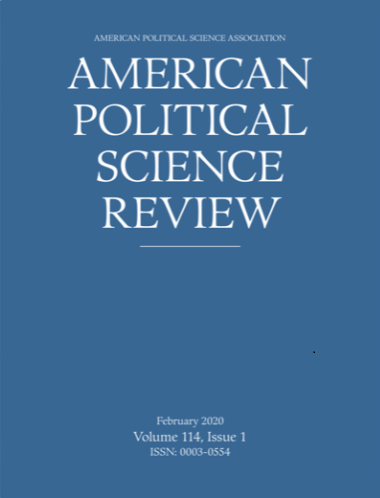愤怒与政治冲突动态
IF 5.9
1区 社会学
Q1 POLITICAL SCIENCE
引用次数: 0
摘要
情感影响着战略冲突的态势。然而,人们对战略和情感因素相互作用、影响国际合作与竞争的确切方式还不甚了解。我们提出了一个不完全信息下的群体间冲突模型,在这个模型中,行为主体对愤怒形式的心理动机非常敏感。当其他参与者的行为导致不如预期的结果时,参与者就会变得愤怒。攻击的动机可能是愤怒,也可能是对另一群体成员偏好的看法。提高一个群体对愤怒的敏感度会使该群体更具攻击性,但却会减少对偏好的了解,从而使另一个群体在应对糟糕结果时降低攻击性。因此,愤怒对冲突发生的可能性具有竞争效应。这些结果对于理解愤怒在国际关系中的复杂作用,以及更广泛地理解心理和物质目标在煽动和改善冲突中的相互作用具有重要意义。本文章由计算机程序翻译,如有差异,请以英文原文为准。
Anger and Political Conflict Dynamics
Emotions shape strategic conflict dynamics. However, the precise way in which strategic and emotional concerns interact to affect international cooperation and contention are not well understood. We propose a model of intergroup conflict under incomplete information in which agents are sensitive to psychological motivations in the form of anger. Agents become angry in response to worse-than-expected outcomes due to actions of other players. Aggression may be motivated by anger or by beliefs about preferences of members of the other group. Increasing one group’s sensitivity to anger makes that group more aggressive but reduces learning about preferences, which makes the other group less aggressive in response to bad outcomes. Thus, anger has competing effects on the likelihood of conflict. The results have important implications for understanding the complex role of anger in international relations and, more generally, the interplay between psychological and material aims in both fomenting and ameliorating conflict.
求助全文
通过发布文献求助,成功后即可免费获取论文全文。
去求助
来源期刊

American Political Science Review
POLITICAL SCIENCE-
CiteScore
9.80
自引率
5.90%
发文量
119
期刊介绍:
American Political Science Review is political science''s premier scholarly research journal, providing peer-reviewed articles and review essays from subfields throughout the discipline. Areas covered include political theory, American politics, public policy, public administration, comparative politics, and international relations. APSR has published continuously since 1906. American Political Science Review is sold ONLY as part of a joint subscription with Perspectives on Politics and PS: Political Science & Politics.
 求助内容:
求助内容: 应助结果提醒方式:
应助结果提醒方式:


